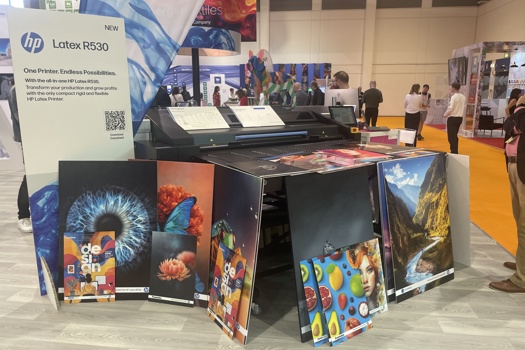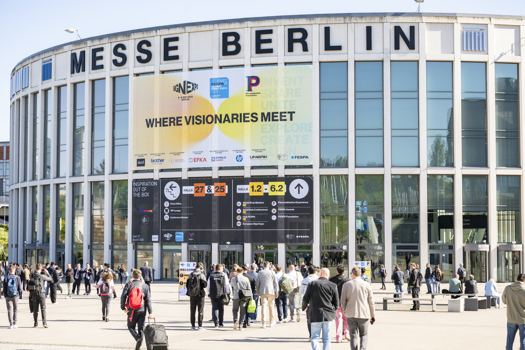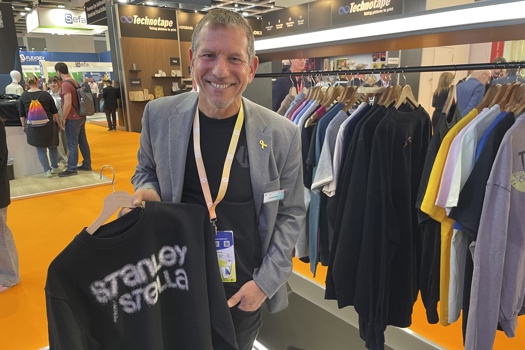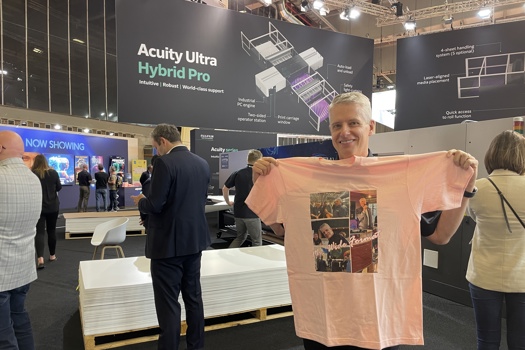Hart & Clough has been able to increase its productivity since it installed the Komori two years ago. It can now print everything from business stationery through to brochures, catalogues, magazines and packaging, taking on jobs that were not viable before.
Established in 1885 by George Hart, who was joined three years later by Ezra Clough, Hart & Clough is a family-run firm with a rich history. The business is overseen by managing director Richard Clough, Ezra Clough’s great-great-grandson. He is the fifth generation of the family to be involved with the company.
The firm offers a wide range of services, says Richard Clough. “We’re a general commercial printers. We do a lot of shade card for textile, floor covering and carpet manufacturers, and print a lot of fairly short-run books and magazines for specialist publishers. We try and deal with end-users as much as we can.”
The Lithrone S529 has had a major impact on the company – by increasing Hart & Clough’s productivity, it has widened its potential customer base. “The main reasons we chose it were the print quality and in particular the quick make-ready time, which in turn has very low overs. It runs all the time the building is open, 16 hours a day, and it is our frontline machine. It’s brilliant,” says Clough.
Straightforward decision
Hart & Clough was so impressed with the machine that it didn’t look at anything else on the market. Clough says: “We were very taken with Komori UK. Its sales side was excellent, not at all pushy or over the top and very amenable to our requests. It was just a very straightforward decision to make. We do a lot of short-run work so maximum speed isn’t as important to us as changing between jobs. We might be doing up to 20 jobs a day, but they might only be 500 or 1,000 sheets per job. So it was that quick turnaround from one job to the next that was important to us and the machine hasn’t disappointed us at all.”
The company’s former frontline machine, an older B2 Roland, didn’t have the automation of the Lithrone S529 and was taking a lot longer to make ready. The Lithrone S529 was such a perfect fit for Hart & Clough that the firm relied on word of mouth and Komori’s reputation to make the purchase, deciding not to trial it in advance.
“We knew a couple of people in the trade who ran Komoris and we did speak to them but we felt confident in dealing with Komori and the backup that they promised us in terms of training, spares and servicing. It just felt like a very comfortable package,” says Clough.
The installation went seamlessly and took around two weeks. Business carried on as normal. “We didn’t have to specifically prepare anything before it was installed as it was replacing an existing machine. It doesn’t require any more power than the previous machine,” reports Clough.
The firm is very pleased with the impact that the machine has had on the firm’s productivity. Clough says: “We’re finding that we can make ready in around 10 to 12 minutes on a job and before it was probably taking an hour. It has semi-automatic plate installation on it and it makes ready from CIP4 ink profiling.
“It really is very accurate; even the first pull off the machine is almost spot-on for colour, working off this ink profile. It also requires very few sheets to make ready. Any changes to the ink value are reflected very quickly in the machine.
“It’s enabled us to take on quite a bit of new work that we wouldn’t have been able to do beforehand. One unusual job we’ve done on it is a limited edition series of books. The customer wanted 140 copies each of 10 different volumes, but there were between 500 and 600 pages in each volume. We used over 2,000 plates on the job so we were thankful for the quick makeready ability of the press. The fact that it can change plates so quickly meant that the job was viable. We’d never even have tackled it on our old machine.”
However, the firm does have one minor gripe with the machine. “It’s quite a tedious job if you’re switching from thin paper to thick board,” says Clough. “It’s a manual adjustment that you have to make and it takes us between 20 and 25 minutes to do. I believe on the bigger Komori machines, it’s an automated process that’s done at the push of a button. It’s the only thing we’ve got to be mindful of, so when we’re scheduling work we try to batch paper and card jobs. Automating that feature would make the machine more or less perfect.”
Harro de Vries, sales support manager at Komori UK, clarifies the board size that requires the higher changeover time: “The LS529 B2 press at Hart & Clough has solid transfer cylinders. This press requires an adjustment for stocks over 500 micron, which we would expect to take approximately 10 to 15 minutes. When returning from heavy board (over 500 micron) to lightweight board/paper stock, the same adjustment has to be made. For a B2 LS29 press with skeleton cylinders this adjustment takes two to three minutes. The stock range of the LS29 presses is from 0.04mm up to 0.8mm.”
Clough has been more than impressed with Komori and its service: “When the machine was new, we were given excellent training from Komori. It didn’t take our two operators who work with the machinery too long to get to grips with it – they’ve both taken to it very well indeed. If we ever need any help with anything, Komori is good from that point of view and makes regular calls to ensure we’re happy. “
Quick response
Komori has been quick to respond to any issues. “We’ve never had anything major go wrong with the machine. Early on we had a software problem and Komori was able to dial in remotely to the machine and fix it. Komori is located fairly close to us too, which is a happy coincidence. It seems to hold a good level of spare parts in the UK, so problems can be resolved quickly,” says Clough.
Overall he is extremely pleased with the investment and now hopes to be able to upgrade in the future. “It’s certainly brought in work which we’d not have considered before, and allowed us to tackle a wider range of work than we were able to do previously. I suppose it’s also brought a desire to have the same machine in the B1 format. It would be a lovely thing to consider as a future investment although I couldn’t put a timescale on when we’d be able to make it,” he says.
He concludes: “The past few years have been tough for all of us and a significant installation like that does boost everybody in a company like ours. The machine has been excellent and I would heartily recommend it to anyone else thinking of buying one.”
Company profile
Hart & Clough is a Yorkshire-based printing firm established in 1885 by George Hart, who was joined three years later by Ezra Clough. It is now run by Clough’s great-great-grandson Richard Clough. Adapting to technological and economic changes over the years, today the £2.5m-turnover, 35-staff business produces books and magazines for specialist publishers and does a lot of shade card work for textile, floor covering and carpet manufacturers. Alongside the Komori Lithrone S529, the company runs two Roland presses and a Heidelberg press, an Autobond laminator, a Muller Martini stitching line and a Muller Martini perfect binder.
Why it was bought…
The firm decided it needed a quicker and more productive machine to lead its operations than its old B2 Roland. It picked Komori’s Lithrone S529 after hearing good things about the machine from people in the trade that ran one. “We were looking for a more modern and more efficient B2 press and the Komori fitted the bill. We felt confident in dealing with the company and it just felt like a very comfortable package,” says Clough.
How it has performed…
It’s done everything that it was bought for, says Clough. The machine has allowed Hart & Clough to take on a range of work that would not have been possible on its Roland and the firm is impressed with Komori’s ongoing after-sales service.
SPECIFICATIONS
Max sheet size 530x750mm
Max speed 16,000sph
Plate size 605x760mm
Feeder pile height 800mm (solid transfer cylinders) 1,000mm (skeleton transfer cylinders)
Delivery pile height 900 mm (solid cylinders) 1,100mm (skeleton cylinders)
Stock thickness range 0.04 – 0.8mm (solid cylinders) 0.06 – 0.8mm (skeleton cylinders)
Footprint 8.2x3.1m
Price £500,000
Contact Komori UK 0113 823 9200 www.komori.eu










